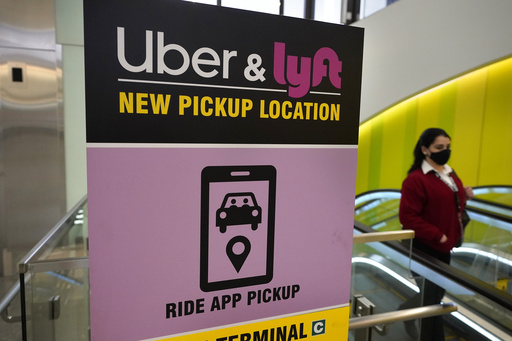MINNEAPOLIS (AP) — Lyft and Uber have said they will halt operations in Minneapolis because of a new city ordinance that increase wages for app-based drivers, the latest salvo in a longtime fight between gig economy workers and the tech giants.
The city’s council vote Thursday overrode a mayoral veto of the measure and means ride-hailing companies will have to pay drivers the equivalent of the local minimum wage of $15.57 an hour. It’s not the first time members of the city council have advocated for a driver pay raise, nor is the issue exclusive to the city or the state.
Here’s what to know about the Minneapolis measure and gig worker negotiations across the country:
WHAT DOES THE ORDINANCE DO?
The City Council’s measure requires requires ride-hailing companies to pay drivers at least $1.40 per mile and $0.51 per minute for the time spent transporting a rider — or $5 per ride, whichever is greater. Tips are excluded. In the event of a multi-city trip, that only applies to the portion that takes place within Minneapolis.
Supporters said the measure prioritizes workers’ rights over corporate greed.
“This is a David and Goliath story,” council member Robin Wonsley, who helped author the policy, said in a statement. “Regular working-class people took on two corporate giants and their political allies, and won.”
Fellow council member Jamal Osman said it will keep the companies from exploiting the city’s East African community for cheap labor.
HOW DID LYFT AND UBER RESPOND?
Lyft and Uber both said they will stop operating in Minneapolis when the ordinance takes effect May 1.
Lyft called the ordinance “deeply flawed,” saying in a statement that it supports a minimum earning standard for drivers but not the one passed by the council.
“This ordinance makes our operations unsustainable,” Lyft said.
Josh Gold, Uber’s senior director of public affairs, said in a statement that the result will be thousands of people out of work and many riders stranded.
“We are disappointed the Council chose to ignore the data and kick Uber out of the Twin Cities,” Gold said.
WHAT ARE RIDERS AND DRIVERS SAYING?
Emmanuel Noah, who has been driving for both companies for years, said Lyft and Uber need to listen to the drivers and he hopes their talk of leaving is a bluff.
Drivers aren’t making enough to make ends meet right now, especially since they have to pay for their cars and maintenance, he added, speaking outside Minneapolis-St. Paul International airport where he was waiting for a fare.
“To put food on the table for our families,” he said. “That’s why we’re looking for a raise.”
Passenger Jake Hay, a frequent traveler who just returned from a business trip, said he typically hails rides to go to and from the airport and also when going out downtown.
It will be less convenient for him if Lyft and Uber leave, Hay said. He doesn’t buy into the companies’ claims that they can’t raise wages and still make a profit.
“These people are making more money than they’ve ever made in their life,” Hay said. “If they’re going to claim that they can’t sustain what they’re doing now and pay these people, they don’t deserve to be around anyway.”
WHAT CAME BEFORE?
The city council previously advanced a similar ordinance that Mayor Jacob Frey also vetoed.
Also last year, the Minnesota Legislature passed a bill that would have mandated higher pay and job security for Lyft and Uber drivers in the state, but Democratic Gov. Tim Walz issued his first-ever veto to quash it.
Uber had threatened to offer only premium-priced service in the Minneapolis-St. Paul area and cut off service altogether in the rest of Minnesota if Walz signed the legislation.
Walz said at the time that he was committed to fair wages but that the bill would have dramatically increased rider costs.
Ahead of the Minneapolis override vote, Walz told The Associated Press that he was concerned about the impact of the city ordinance. He warned that the companies would depart and leave a gap for those who depend on the services, including disabled people.
WHAT COMES NEXT?
Both Lyft and Uber nodded to the potential for statewide legislation that would counteract the city ordinance. House Republicans proposed a bill Thursday that would preclude local officials from enacting such regulations.
Walz told AP he hopes the Legislature will seek a compromise that includes fair pay for drivers but also dissuades the companies from leaving the market.
WHERE ELSE HAS THIS HAPPENED?
Gig economy workers have protested across the country to decry low wages and poor conditions, including a Valentine’s Day strike last month by ride-hailing drivers.
Some cities have moved to regulate the companies, with mixed results.
Measures last year in New York City and this year in Seattle established an $18 hourly minimum wage for food delivery workers.
While platforms like Uber Eats and DoorDash still operate in New York City under the new rules, they have limited workers hours there.
In 2016, Austin pushed for fingerprint-based background checks of Lyft and Uber drivers as a rider safety measure. Both companies pulled out of the city, returning only after the Texas Legislature passed a law implementing different rules statewide.
In California an appeals court sided with Lyft and Uber in ruling that they can continue to treat drivers as independent contractors, meaning they are not entitled to benefits. The state Legislature had passed a law in 2019 forcing them to treat drivers as employees.
President Joe Biden’s administration recently enacted new standards on the classification of workers as independent contractors. Companies like Lyft and Uber say the rules wouldn’t impact how they classify their drivers, though some warn that it could depend on how the Labor Department decides to enforce the standards.
Source: post





